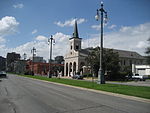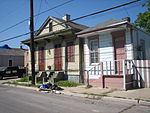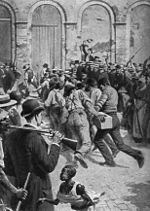Carver Theater (New Orleans)
Historically African-American theaters and music venuesMusic venues in LouisianaNational Register of Historic Places in New OrleansPerforming arts centers in LouisianaTheatres in New Orleans ... and 3 more
Theatres on the National Register of Historic Places in LouisianaUse American English from November 2019Use mdy dates from November 2019

The Carver Theatre is a theater located in New Orleans, Louisiana. The theatre was originally built in 1950 and was used for concerts, plays, off-broadway shows, films, conventions, graduations, Mardi Gras balls, dance recitals, corporate events and private parties.
Excerpt from the Wikipedia article Carver Theater (New Orleans) (License: CC BY-SA 3.0, Authors, Images).Carver Theater (New Orleans)
Orleans Avenue, New Orleans Storyville
Geographical coordinates (GPS) Address Nearby Places Show on map
Geographical coordinates (GPS)
| Latitude | Longitude |
|---|---|
| N 29.96708 ° | E -90.07665 ° |
Address
Orleans Avenue 2101
70112 New Orleans, Storyville
Louisiana, United States
Open on Google Maps






